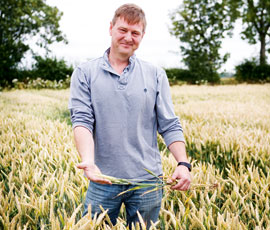FW Awards 2011: Arable Farmer of the Year finalist – Ben Binder

Ben Binder
Faversham, Kent
It takes just a few ryegrass plants in each square metre to significantly reduce cereal yields and Ben Binder faced such a challenge when he started at Belmont Farm 10 years ago.
But since then, he has cleared the grassweed problem and his crops regularly feature at the top of the Sentry league table. In 2007 he had the second highest gross margin in the company for milling wheat and last year, he was 10th for wheat with a cost of production of £53.9/t and yield of 9.5t/ha.
Ben manages 560ha of cropping on four Belmont Estate farms for Sentry under a hybrid contract farming agreement and he also crops 188ha in a collaboration agreement with a neighbour. This increase in farmed area has decreased fixed costs, allowing further investment in machinery.
He is successfully farming hugely variable land ranging from poorer light brash through to clay over flint/chalk with an average field size of just 10ha.
Cropping comprises of 20% milling wheat 21%, 10% second wheat, 24% feed wheat, 23% oilseed rape, 16% spring beans and 6% millet.
“To tackle the Italian and perennial ryegrasses, we went back to the plough, but yields did suffer as non-inversion suits the land more.”
The rotation is based on wheat followed by oilseed rape, wheat and then spring beans. This year, Ben has introduced millet as an alternative break crop, growing it on contract for the bird food market.
It has replaced some of the beans plus a field of rape that had to be ripped up because of extensive pigeon damage. “Millet is a low input crop and we are aiming for a yield of 1.25-1.5t/acre.
“We’ve grown peas before but we got fed up of combining peas that had hit the deck resulting in flints entering the combine.”
His 80ha of Fuego spring beans are looking excellent despite the dry season, which he puts down to drilling depth. “We drilled them as deep as possible which was 4.5-5in and it has helped overcome the lack of moisture.”
Beans are also proving valuable on his neighbour’s land, in helping them tackle triple “R” resistant blackgrass, alongside other cultural controls.
In one field of wheat following beans, Ben upped the seed rate to 350 seeds/sq m and opted for the more competitive variety Solstice. It received a pre-emergence programme of Trooper (flufenacet + pendimethalin) + Grounded.
“It has proved so successful that it did not require any spring grassweed treatments. I was sceptical, but it has been effective.”
Another key challenge is pigeon damage due to all the surrounding woodland.
Castille and Sesame are the varieties of choice this season and he believes the key is to get crops established well in the autumn so that they can withstand the pigeon onslaught after Christmas. This is achieved by using seed-bed fertiliser and drilling crops early.
“We did try hybrids, but we didn’t see any benefit for the extra seed cost. We have seven gas guns going full-time and religiously tend to them everyday.”
Balance is the key word with his environmental approach with some less productive areas allowed to revert back to naturally chalk down land and he has planted miles of new hedge. This year sees the start of a new HLS agreement which will see extra measures, such as non-harvest spring cropping.
For first time this year, he hosted an Open Farm Sunday event at Belmont House with key machinery displayed and information on cropping. “We had over 400 people come along and we will definitely do it again next year,” says Ben.
“One of the largest problems facing the industry is the lack of young people coming into it and events like Open Farm Sunday can do no harm.”
Farm facts
• Cropping 748ha across five farms
• Mix of estate (four farms) plus collaboration with a neighbour
• Growing wheat, oilseed rape, spring beans and millet
• Two staff, Ben plus an estate man who helps at harvest.
The judges liked
• Cleared up ryegrass problem
• Good bean crop despite spring drought
• Simple system coping with variable soil types
• Well-established oilseed rape crops
• Involvement with local school

